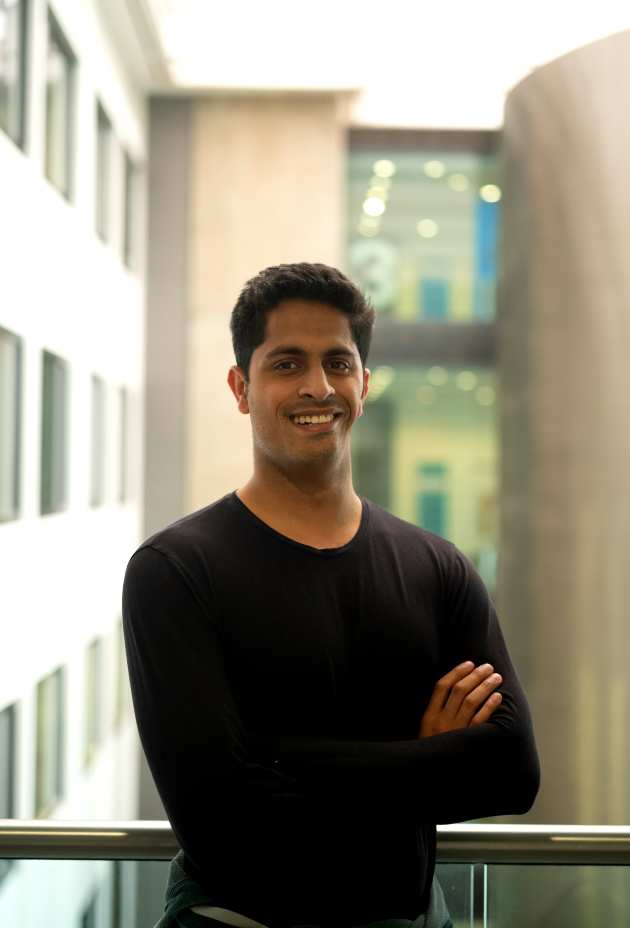Rikeen
Rikeen is doing his PhD in the Tribology group.
"It’s a very supportive and collaborative environment. Additionally, the nature of my PhD allows quite a lot of autonomy in the way that I work. "
When did you decide to do a PhD and why?
Prior to the start of my PhD, I did my undergraduate degree here in the Mechanical Engineering Department at Imperial College London. Initially I was actually going leave the field of engineering and pursue investment banking. However, in the final year of my MEng degree, I began to thoroughly enjoy my final year individual project and was offered an opportunity to continue through to a PhD. I realised that fields such as finance would be around for a while, but this was a once in a lifetime opportunity to join one of the largest Tribology/Biotribology divisions in the world. So I took it. 
Can you describe your experiences studying a PhD here?
Imperial is a fantastic place to study as many world experts in their field actually teach here. As a result, it’s a very supportive and collaborative environment. Additionally, the nature of my PhD allows quite a lot of autonomy in the way that I work. It allows me time to also develop in other areas of my life, from going to the gym, to learning programming.
What is your PhD research about?
Largely due to the complexity of the skin, we don’t understand how humans “feel” surfaces. That is to say, we do not understand how stresses, strains and vibrations propagate through the skin layers to the sites of our mechanoreceptors. My current area of research involves numerically modelling skin-surface interaction in order to better understand the sensations of touch and perception. This involves developing finite element models of multi-layered soft tissue to observe the stress/strain fields in the vicinity of mechanoreceptors.
What would you say about the supervision you receive?
As I was able to continue working with the same supervisor that I had during my MEng final year project (Dr Marc A. Masen), I was already very comfortable working with him. I readily receive any support I require, if he doesn’t know how to solve the problem, he can easily point me in the direction of someone who can. In general the same can be said for most supervisors, but it should be noted that you definitely need to ask for help if you need it, as everyone is very busy, so don’t feel shy to bug them!
What has been the best thing so far about your experience of studying for your PhD here?
The best things about my PhD include the people that I am surrounded with, the autonomy I receive when working and the fact that by doing a PhD, I finally have the time to really dig deep into a field that I enjoy. Additionally, it is typically more like a 9 to 5 job as oppose to the undergraduate course where you tend to work far longer hours. As a result you have more time to work on yourself personally, professionally and indeed socially.
How do you spend your time when you are not working on your PhD?
I enjoy going out with friends in the evening to different restaurants, going to the gym, sports/martial arts, and learning programming languages like Python.
Do you have any thoughts about where you might like to go in the future?
I am still relatively early on in my research. As a result I am trying to keep my options open. Within the sphere of engineering, there is the opportunity of going into industry or continuing into academia (via doing a post-doctoral placement). Additionally, at least at this moment, I am still open to going into sectors such as tech/data-science, consulting or finance. Who knows what the future will hold!
What advice would you offer to students considering applying for a PhD at Imperial?
In my personal opinion…do it. How often do you get the chance to pursue something you want…purely because you find it cool! You will get the opportunity to work in a world-leading academic institution and become a world expert in your field. Additionally, in my opinion, 3-4 years is a relatively small amount of time in the grand scheme of things, so even if you feel research isn’t for you, you can still pursue other ventures afterwards…you have the rest of your life to work!


